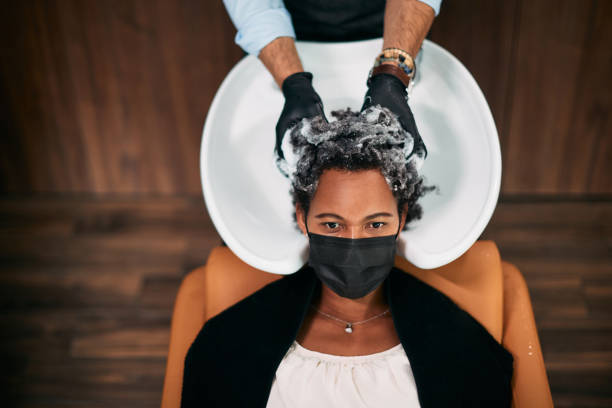How Often Should You Wash Your Hair: A Guide for All Hair Types

How Often Should You Wash Your Hair: A Guide for All Hair Types
Washing your hair is a simple act most people indulge in at any time. For many, the question of hair washing frequency lingers. Daily? Every other day? Once a week? The truth is, there's no universal answer. This article explores how often you should wash your hair, know your hair type, and healthy ways to care for it.
Know Your Hair Type
Oily Hair
Does your hair appear greasy by mid-day? You likely have oily hair. Daily washing might seem like the answer, but it can backfire! Frequent washing strips away natural oils, triggering your scalp to produce even more. Aim for every-other-day washes with a gentle, clarifying shampoo. Applying a dry shampoo between washes helps absorb oil and refresh your hair.
Dry or Damaged Hair
Dry or damaged hair craves moisture. Frequent washing can worsen the problem by stripping away the natural oils. If you have dry or damaged hair, wash it every 2-3 days, using a hydrating shampoo and conditioner suitable for your hair type. Deep conditioning treatments once or twice a week can restore moisture and shine.
Fine Hair
Fine hair can appear limp and lifeless when weighed down by oil build-up. Shampooing every other day helps maintain volume without stripping away natural moisture. Look for volumizing shampoos and lightweight conditioners to avoid a weighed-down look.
Curly Hair
Curly hair is drier and more prone to frizz. Frequent washing can disrupt the curl pattern. If you have curly hair, wash every 3-5 days. Incorporate a co-washing technique, like cleansing with conditioner between washing. Doing this helps to remove dirt and product buildup without stripping away moisture.
Deep conditioning treatments are curly hair's best friend. They promote elasticity and give the hair a defined look.
Textured Hair
Like African American hair, textured hair tends to be dry and prone to breakage. Frequent washing can increase dryness. For this hair type, wash once a week or every other week, using mild, moisturizing shampoos and conditioners. Deep conditioning treatments are crucial for maintaining healthy, hydrated hair.
How Do I know I have Scalp Issues?
A healthy scalp is the foundation for healthy hair. It might be a sign of a scalp issue if you experience itchiness, flaking, or redness. Don't hesitate to consult a dermatologist! Dermatologists can diagnose the cause and recommend tailored treatment options. Treatment might involve medicated shampoos alongside adjustments to your washing routine.
What Factor Should I Consider Before Washing?
Individuals who exercise routinely and those living in humid climates might need to adjust their washing frequency. Sweating can build up on the scalp, requiring more frequent cleansing. But resist the urge to over-wash. Choose a gentle shampoo and focus on cleansing the scalp, while being gentle on the hair lengths.
Are Conditioners Good for the Hair?
Conditioner replenishes moisture and adds shine. Some conditioners can leave buildup on the scalp, especially for oily hair types. Apply conditioner to the mid-lengths and ends of your hair, while avoiding the roots. Consider a scalp-clarifying shampoo once or twice a week to remove product buildup.
5 Washing Tips for Healthy Hair
- Less is More: You don't need a lot of shampoo. A small amount, lathered well, is enough to cleanse the scalp.
- Tepid Water: Hot water is damaging. Use lukewarm water for washing and rinsing to avoid stripping off the natural oils.
- Fingertip Massage: To avoid irritation, massage the shampoo into your scalp using your fingertips, not your nails.
- Conditioning: Apply conditioner to the mid-lengths and ends of your hair, focusing on areas that need extra moisture.
- Thorough Rinse: Rinse thoroughly to remove all shampoo and conditioner residue. Build-up can weigh down your hair.
Alternative Cleansing Methods
Dry Shampoo
This hair hero absorbs excess oil and refreshes your hair between washes. Apply it to the roots, focusing on oily areas, and massage it before brushing through.
Co-Washing
This method uses conditioner to cleanse the scalp and hair. This is particularly beneficial for curly or textured hair. Choose a lightweight conditioner and focus on the scalp, massage it thoroughly before rinsing.
Conclusion
The ideal hair-washing routine is a personal journey. Experiment with different frequencies, products, and techniques until you find the right that gives you healthy hair. By understanding your hair type and scalp needs, you can create a routine that unlocks your hair's full potential and keeps it looking its best.
